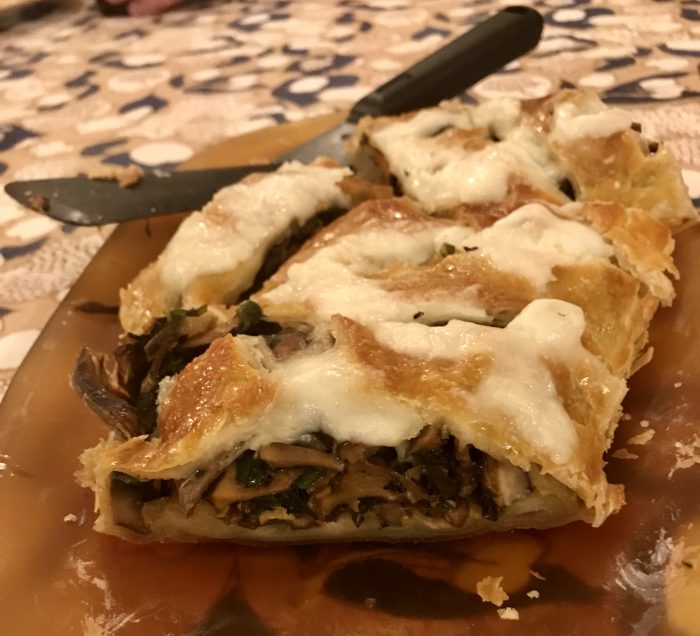
This column is the result of a project that began last fall, but it is so timely, that I am submitting it now as a tribute to the people of Ukraine and all of Eastern Europe.
When I was in Pennsylvania last fall, I came across some lovely oval-shaped purple plums that were new to me. So, of course, I purchased them.
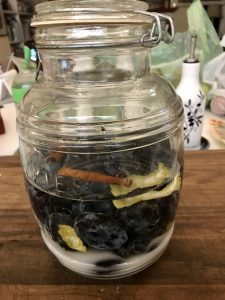
I found that they are the perfect plums for making slivovitz, also known as plum brandy or schnapps, a traditional drink of choice all over Eastern Europe. It is imbibed at gatherings and celebrations, at times of sorrow and of joy. It embodies tradition and friendship and family ties. It is often served as an aperitif, but I chose to serve it after dinner, as it was somewhat sweet.
My nephew in PA, of Serbian origin, told me that if the sliv is sweet, you should serve it with something salty, so I suppose I could have had it with the appetizers. I will next time.
I located a recipe in the Washington Post and proceeded to experiment.
When it was ready to taste in mid-February, I invited some friends over for the first sips, and that led to a dinner based on some dishes familiar to Eastern Europeans.
We started with a tray of pickled beets and pickled eggs along with roasted, charred little sweet peppers, sprinkled with salt.
Then, what is an Eastern European meal without borscht topped with sour cream?
The next course was a mixed-mushroom strudel with a side of white bean spread, topped with sliced onions sautéed in tomato paste with salt and sugar. Sounds strange, doesn’t it? But it was tasty. Served with cucumber spears for dipping, it was also refreshing.
I am afraid I cheated with the dessert. A fruit strudel came to mind, but two strudels in one meal was not appetizing, especially following a heavy main course. So, I used small (1 or 2 bites) filo cups with a spoonful of chocolate tahini and a dab of Amareno cherry jam.
It was good to have friends around the table again, and the slivovitz did honor our friendships!
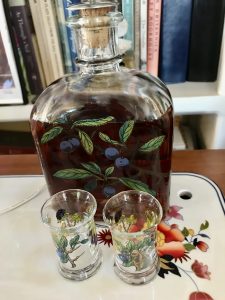
SLIVOVITZ
For 1.5-2 quarts you will need a half-gallon glass jar with a tight-fitting lid.
- 2 1/2 pounds of fresh “prune plums”
- 1 1/2 cups sugar
- 1 x 3-inch cinnamon stick
- 2 x 1-inch pieces of lemon peel (with no white pith)
- 4 cups vodka or Everclear grain alcohol, plus more as needed. (How about Stoli from Latvia? Their website states, “Stoli has a long history of fighting oppression from the Russian regime. We unequivocally condemn the military action in Ukraine and stand in support of the Ukrainian people.”)
- Use a sharp paring knife to pierce the plums through to the pit, cutting each plum 3 or 4 times, and examining each plum, as bruised fruit ferments too quickly.
- Do not remove the pit. It is crucial to the flavor of the finished product.
- Pack the fruit into the jar and add the sugar, cinnamon stick, and lemon peels. Pour in enough vodka to completely cover the plums and tighten the cap.
- Every day for two weeks, invert the jar. I didn’t trust that it would not leak when turned upside down, so I placed the jar in a large stainless bowl. It did not leak. But if it had, I would have simply poured the leakage back into the container.
- At the end of two weeks, the sugar will have dissolved.
- Place the jar in a closet or other dark space for 90 days.
- Strain the finished slivovitz through a coffee filter, and pour into a storage container or gift bottles.
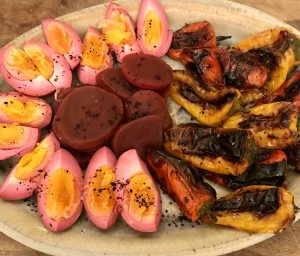
PICKLED BEETS AND EGGS
- 8 medium fresh beets
- 1 cup vinegar
- 1/2 cup sugar
- 1 1/2 teaspoon whole cloves
- 1 1/2 teaspoon whole allspice
- 1/2 teaspoon salt
- Scrub beets and trim tops to 1 inch. Place in a Dutch oven, add water to cover. Bring to a boil.
- Reduce heat and bring to a simmer. Cover and simmer for 25-30 minutes or under until tender.
- Remove beets from water. Cool.
- Peel beets, slice, and place in a jar. I use the same glass jar that I made the slivovitz in, or a similar one. Set aside.
- In a small saucepan, combine vinegar, sugar, cloves, allspice, and salt.
- Bring to a boil, and boil for 5 minutes.
- Pour over the beets. Refrigerate for at least 1 hour.
The next day, hard cook the eggs. I love pickled eggs, so I often do a dozen at a time.
Peel, and when cool, place them in the jar along with the beets and pickling liquid.
Allow to sit for two days or longer.
MUSHROOM STRUDEL
- 1 package frozen puff pastry, thawed
- 1 1/2 pounds assorted fresh mushrooms, sliced
- 3 tablespoons butter
- 1/4 cup extra virgin olive oil
- 1 large shallot, finely chopped
- 2 cloves garlic, finely minced or pushed through a garlic press
- Sea salt and black pepper
- 2 tablespoons each fresh thyme, chives, French tarragon, flat-leaf parsley, finely chopped
- 1 large egg plus 1 large egg yolk, beaten together
- 1 large egg plus 1 teaspoon water for egg wash
- In a large skillet, heat butter and olive oil. Add shallots and garlic, and soften.
- Add sliced mushrooms.
- Season with salt and pepper, and cook over low heat until tender. If juices exude, raise the heat and cook until they evaporate.
- Stir in 3/4 of the herbs and remove from heat. Spread mushrooms on a pan (half-sheet) to dry and let cool completely, about 30 minutes.
- When dry and cool, transfer mushrooms to a large bowl and combine with whole egg/egg yolk mixture.
- Place rack in the middle of oven and heat to 400F.
- Place puff pastry sheet on a parchment-lined sheet pan. Roll to remove any creases and to elongate.
- Brush the surface with egg wash, and sprinkle on the remaining herbs.
- Spread mushrooms evenly down the center of the pastry sheet and fold over each of the long sides to cover the mushrooms and tuck in the ends.
- Move strudel to the center of the pan and brush entire surface with egg wash.
- Make shallow slits diagonally across the top.
- Bake until golden brown and puffed, approximately 15-30 minutes.
- Let rest for at least two minutes before slicing with a serrated knife.
- The recipe does not call for cheese, but I had some fresh Italian mozzarella and placed a few slices on top when I put it in the oven.
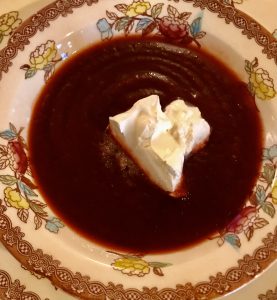
POLISH BORSCHT
- 4 whole beets
- 4 cups stock. (I used vegetable, as this was a vegetarian dinner.)
- 1 clove garlic, minced
- 2 tablespoons fresh lemon juice
- 1 teaspoon sugar
- Salt, to taste
- Black pepper, to taste
- Chopped fresh dill
- Heat oven to 400F.
- Wrap beets in aluminum foil and place in a baking dish or on a foil-lined baking sheet.
- Roast until tender, about 30-45 minutes.
- When cool, peel and slice into strips.
- Place in a blender with garlic, lemon juice, sugar, salt, and pepper.
- Bring stock to a boil and add the contents of the blender. Simmer for 10 minutes.
- Serve hot or chilled
- Top with a dollop of sour cream, and a sprinkle of fresh, chopped dill.
Ukraine is famous for its borscht. It is frequently called its place of origin.
As I mentioned, I didn’t use a Ukrainian recipe since my dinner was vegetarian. However, next time I will do it the Ukrainian way, adding meat, (like shredded pork or pork sausage), cabbage, potatoes, tomato paste, carrot, parsnip, onion, bacon, butter, vinegar, and garlic, and beef broth.
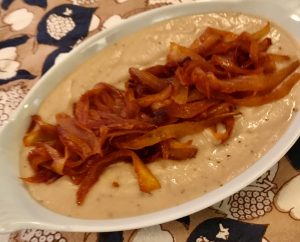
ROMANIAN WHITE BEAN DIP
- 1 X 15 oz. can white beans, such as cannellini
- 2 medium white onions
- 2 cloves garlic
- 2 teaspoons sweet smoked paprika
- 3 tablespoons vegetable oil
- 1 tablespoon tomato paste
- 1 teaspoon sugar
- 2 tablespoons extra virgin olive oil, divided
- Salt and pepper to taste
- Hot paprika or cayenne for garnish
- Drain and rinse the beans.
- Place in blender or food processor with the vegetable oil, garlic, and sweet paprika.
- Blend until smooth.
- Add salt and pepper to taste.
- Thinly slice the onions. Place in sauté pan over medium-low heat along with the olive oil.
- Cook slowly, about 20 minutes.
- When they begin to brown, add the tomato paste and sugar.
- Continue to cook until they turn a deep reddish-brown color.
- Place the bean dip in a bowl or small platter, and sprinkle on the paprika or cayenne.
- Top with the onion.
I served it with cucumber spears, but a hearty country bread would be good.
CHARRED SWEET PEPPERS
- 1 bag of small, multi-colored sweet peppers
- Extra virgin olive oil
- Kosher sale
- Clean the peppers and leave whole.
- Place in a bowl and pour extra virgin olive oil over them.
- Toss the peppers in the oil and place on a parchment-lined sheet pan.
- Sprinkle salt over all.
- Place in the broiler and keep an eye on them.
- After only a few minutes, they will begin to char. Remove from oven, and carefully turn the peppers to ensure even-charring.
- Place back in the broiler for another few minutes.
Count your blessings as you put food on your table. Give thanks for our good fortune and pray for those in need.




